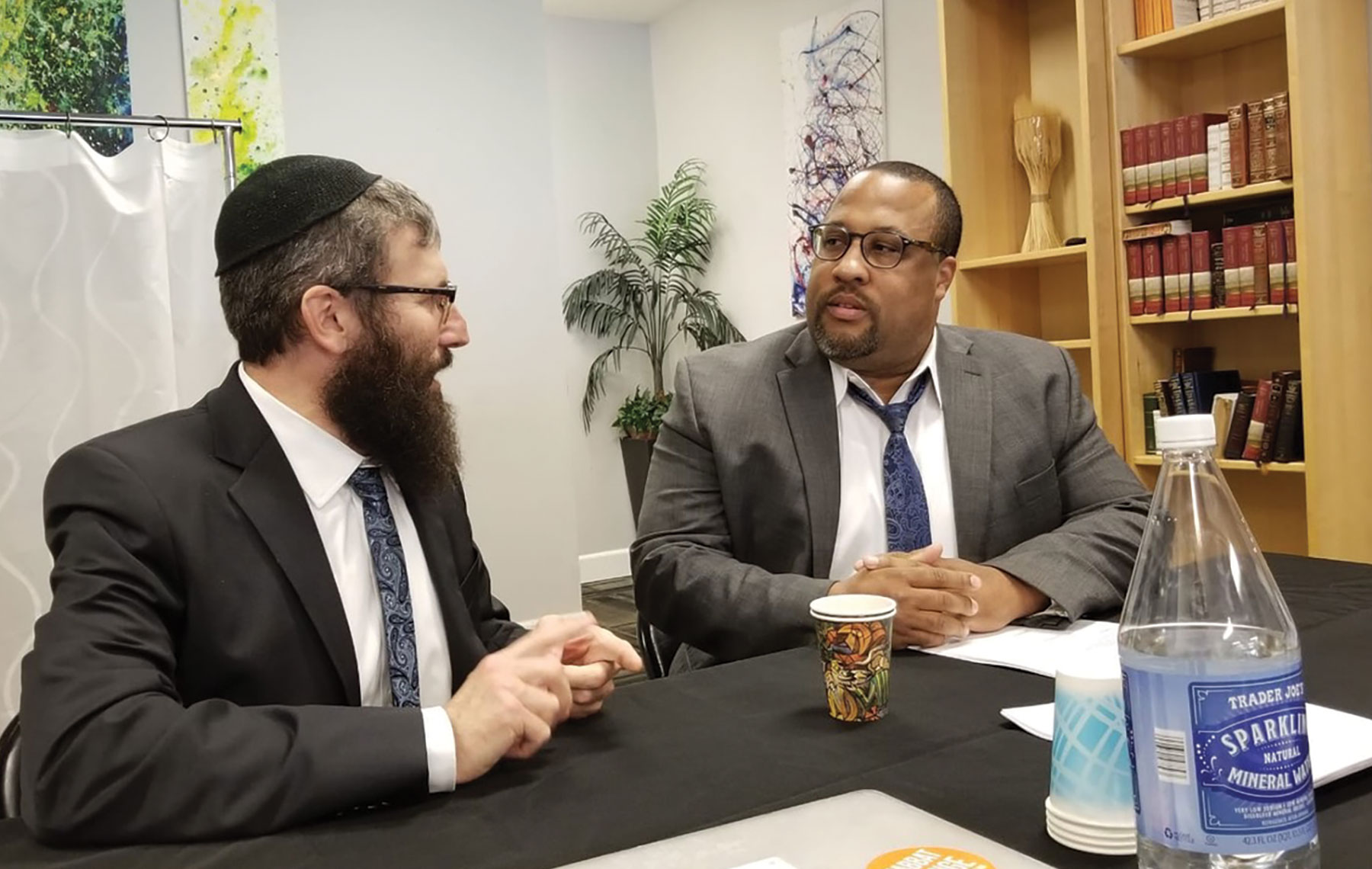 Rabbi Yonah Bookstein meets with the city’s petroleum administrator Uduak-Joe Ntuk.
Photo courtesy of Pico Shul
Rabbi Yonah Bookstein meets with the city’s petroleum administrator Uduak-Joe Ntuk.
Photo courtesy of Pico Shul Unpleasant odors wafting into Rabbi Yonah Bookstein’s office sometimes prompt closing the windows. The stench is not from exhaust typically clogging the heavily trafficked West Pico corridor. Rather, the air reeks of fumes from 40 heavily camouflaged oil drilling and acid fracking wells operating directly across the street from Pico Shul on West Pico Boulevard.
“So many people don’t know this is happening right across the street from our shuls, homes and schools,” Bookstein told the Journal.
Bookstein began researching the issue about a year ago and discovered a spate of drilling sites plagued by violations. He also unearthed a lack of ordinances protecting citizens. There is no statewide barrel tax and what he terms, “greater concern for profit than human cost.”
Inspired by Stand-L.A., a local environmental justice coalition of community groups seeking to end neighborhood oil drilling, Bookstein also has spoken with public officials. Since Rosh Hashanah, Bookstein has hosted two separate gatherings for the public to speak with the city of Los Angeles’ petroleum administrator Uduak-Joe Ntuk and 5th District City Councilmember Paul Koretz.
These meetings — as part of Bookstein’s newly formed Pico-Robertson Coalition on Health and Safety — precede public committee meetings on Ntuk’s July 29 report to the city on the feasibility of closing oil-drilling study.
“There are 300 drilling districts in the city… and many wells we are unaware of,” Ntuk said. Ntuk said before his appointment in 2016, multiple city departments with no centralized office addressed oil and gas regulation.
The first of several public meetings discussing Ntuk’s recently released 172-page report is slated for Oct. 15. The public can submit concerns online.
Ntuk is recommending a 600-foot setback around drilling sites based on a mutiple-year study. However, for many, that is not good enough.
“I am very concerned the city is not taking enough precautionary measures to protect the community,” attorney Aimee “Aviva” Zeltzer told the Journal. The former South Robertson Neighborhood Council at-large representative and green team co-chair who attended both Pico Shul meetings added, “Toxic fumes are already affecting people who have experienced daily migraines, dizziness and other symptoms due to the constant smell of petroleum, benzene and sulfur.”
The suggestion of a half-mile human health and safety buffer zone is based on scientific findings, Bookstein said.
At the Oct. 10 meeting, Koretz extended his arm behind him toward the drilling site and said, “You don’t even have 50 feet here. I would like to see all oil operations shut down within 2,500 feet of people and I’d like to see it done as quickly as possible. And if there is an argument that it could take 20 years, I don’t buy it.”
Although property deeds list mineral rights and the industry provides modest quarterly dividends, the Cardiff drilling site across from Pico Shul is obscured by tall walls, greenery and an ersatz synagogue tower. Built by Occidental Petroleum in 1966, the yard stretches two city blocks, from Cardiff Avenue to Oakhurst Avenue to South Doheny Drive.
The 175-foot-high Cardiff Tower, owned by Pacific Coast Energy Co. (PCEC) since 2016, is a windowless, mobile structure that slides on tracks over the wells. Its faux Ten Commandments loom over more than 50 real synagogues, schools, businesses, and other faith institutions. Numerous kosher eateries, private homes and apartment buildings also fall within a half-mile radius.
“I would like to see all oil operations shut down within 2,500 feet of people and I’d like to see it done as quickly as possible. And if there is an argument that it could take 20 years, I don’t buy it.”
— City Councilmember Paul Koretz
Originally hailed as the first “architecturally designed oil derrick,” the Cardiff Tower was masked in a beige-and-white facade. It is vaguely disguised as a synagogue to allay fears in a Jewish neighborhood that has boomed since World War II. Los Angeles evolved over oil fields discovered in the 1890s. The population exploded from 50,000 at that time to 1.2 million by 1930. According to Stand-L.A., more than half a million Angelenos currently reside less than a quarter mile from an active oil well.
Although the site is often quiet, a distinct early morning “ring-a-ting-ting” echoes over the oil fields, said Bookstein, who recently walked inside after passing an open door. “The stench is so foul,” he said. “It’s another world in there.”
A sign posted on the drilling site wall warns of prolonged exposure. If a buffer zone is approved, the ruling could force closure. Given corporate response elsewhere, officials expect enforcement might be delayed.
“Other jurisdictions in California and across the country have attempted to ban oil drilling,” said Koretz’s planning deputy, Aviv Kleinman. “They have all been met by multiple lawsuits by major oil corporations and other stakeholders.”
When asked about the concerns over the site, Ben Oakley, senior environmental health and safety manager for PCEC, said, “Significant regulations and mitigation measures already exist to ensure public health and the environment are not affected by oil and gas operations.”
Zeltzer thinks otherwise. “It seems like the city is pouring taxpayers money into time-consuming reports and statistics instead of getting an injunction to build the 2,500-foot barrier immediately,” she said. “My greatest fear is that there will be long-term consequences that we will not know about it until it is too late.”
For more information, visit actionnetwork.org/groups/pico-robertson-health-safety.
Lisa Klug is a freelance journalist and the author of “Cool Jew” and “Hot Mamalah: The Ultimate Guide for Every Woman of the Tribe.”





















 More news and opinions than at a Shabbat dinner, right in your inbox.
More news and opinions than at a Shabbat dinner, right in your inbox.